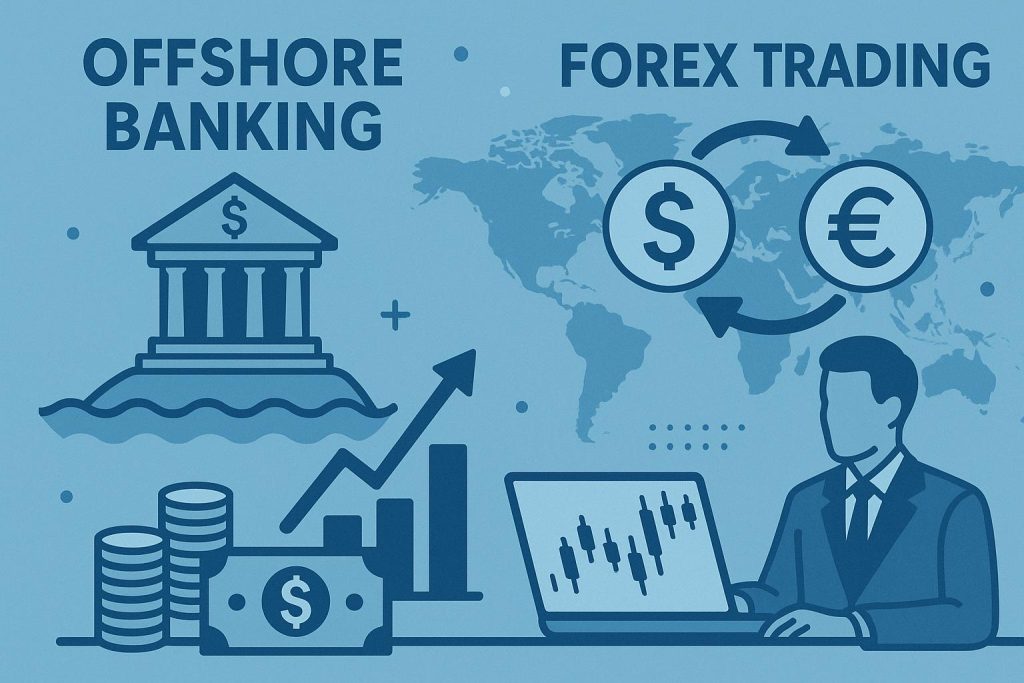Offshore Banking and Foreign Exchange (Forex) Trading

Understanding Offshore Banking
Offshore banking involves managing one’s financial assets with institutions located outside of the depositor’s home country. This financial strategy is often utilized by individuals and businesses looking for benefits unavailable in domestic banking systems. Privacy stands out as a primary advantage of offshore banking, as many jurisdictions enforce laws safeguarding account holders’ identities and financial records. This level of confidentiality serves as an essential aspect for those aiming for asset protection and tax efficiency.
Moreover, offshore banks often offer a wide array of financial services. These services include international investment opportunities and the ability to hold multi-currency accounts, which is especially beneficial for expatriates and global businesses. Access to diverse currencies and investment portfolios opens up opportunities in various international markets, allowing clients to leverage economic strengths and minimize currency risks across different regions.
Legality and Regulations
Although offshore banking holds several advantages, understanding the legal framework surrounding it is paramount. Clients must adhere to tax obligations and disclosure requirements in their home countries. With increased global focus on preventing tax evasion and money laundering, many countries have entered into information-sharing agreements. These agreements aim to bolster transparency and ensure that offshore banking is not used for illicit activities. Therefore, accountability and adherence to both domestic and international laws become crucial for anyone involved in offshore banking.
The regulatory landscape is continuously evolving, reflecting ongoing efforts to close loopholes and tighten anti-money laundering rules. Not only does this legal vigilance protect sovereign tax revenues, but it also aims to maintain the integrity of international finance. Clients must remain informed about changes in legislation to fully benefit from the legitimate advantages of offshore banking and avoid potential pitfalls.
Exploring Forex Trading
Foreign Exchange, commonly referred to as Forex or FX trading, is the process of converting one currency into another through an open market. As the largest financial market globally, it sees a staggering daily trading volume surpassing $6 trillion. Forex trading provides avenues for investors to speculate on currency values and profit from fluctuations in exchange rates, offering both opportunities and challenges.
Understanding Forex Market Operations
The Forex market is unique due to its operational structure. Unlike centralized exchanges, Forex trading is over-the-counter (OTC) and takes place via a network of banks, brokers, and other financial institutions. This decentralized nature allows participants to execute trades virtually any time of the day, spanning the globe 24 hours a day, five days a week. The continuous nature of the market allows traders to rapidly respond to market events, regardless of traditional stock market hours.
Key Forex Terminologies
To effectively engage in Forex trading, understanding its terminology is vital. A currency pair is at the core of each Forex transaction, representing the two currencies being exchanged against one another—such as the EUR/USD pair. The exchange rate reflects how much one currency is worth in terms of another, dictating the terms under which currencies are traded. The spread, meanwhile, is a critical concept as it represents the difference between the bid and ask prices, playing a significant role in determining the cost and potential profitability of trades.
Risks and Considerations
Engaging in Forex trading comes with inherent risks. The high volatility of currency values is influenced by a wide range of factors, including economic data, political stability, and overall market sentiment. Traders must be equipped to navigate these unpredictable shifts, often employing tools like stop-loss orders to limit potential financial setbacks. As with all investments, it is crucial to only risk capital that can withstand loss without jeopardizing personal financial stability.
Integrating Offshore Banking and Forex Trading
The integration of offshore banking with Forex trading offers strategic advantages. Offshore financial institutions often provide access to international investment accounts, facilitating the holding of funds in multiple currencies. By doing so, traders can manage their currency exposures more effectively and exploit favorable exchange rate movements to optimize returns.
Offshore centers renowned for financial services frequently accommodate Forex trading accounts, presenting specialized services tailored to traders’ needs. Such environments can offer strategic insights and bespoke solutions aimed at enhancing trading efficiency and compliance.
Nevertheless, due diligence is critical. Potential investors and traders should thoroughly research financial institutions and providers to ensure security and compliance in their operations. Selecting reputable partners, particularly those with a proven track record and transparent practices, is imperative to safeguard investments and uphold lawful standards.
For individuals seeking a deeper understanding of offshore banking and Forex trading, professional consultations and financial advisory websites can serve as valuable resources. Remaining vigilant of legal regulations and evolving market conditions is a prerequisite before diving into these financial endeavors. By proactively engaging in informed decision-making and strategic planning, participants can harness the benefits of these financial avenues effectively, aligning their pursuits with long-term financial goals and compliance objectives.
This article was last updated on: September 4, 2025
